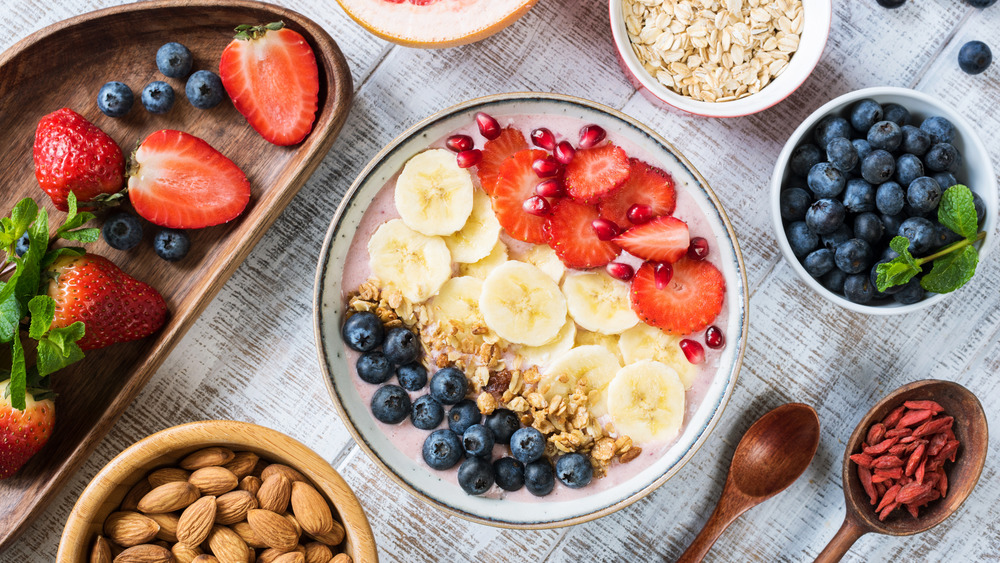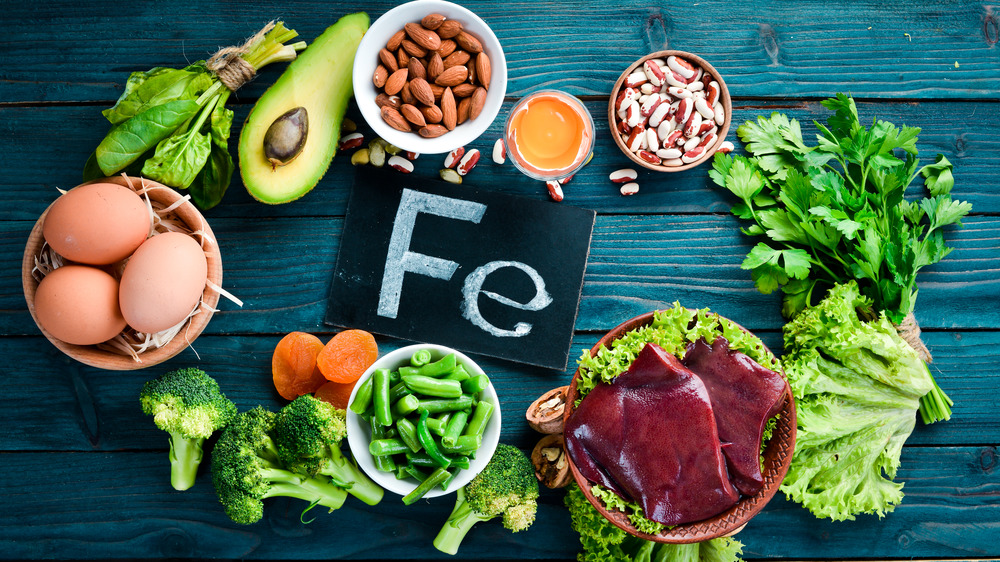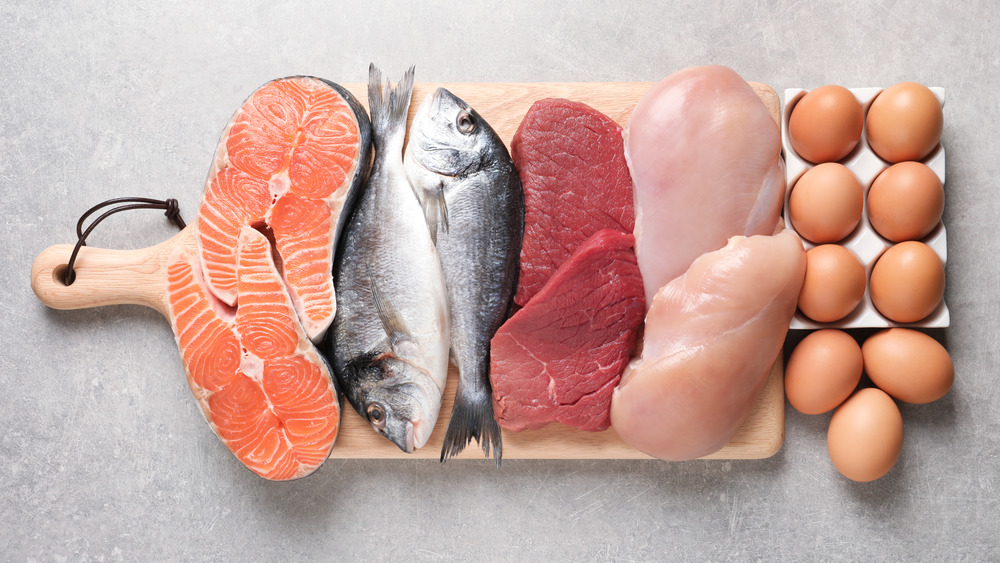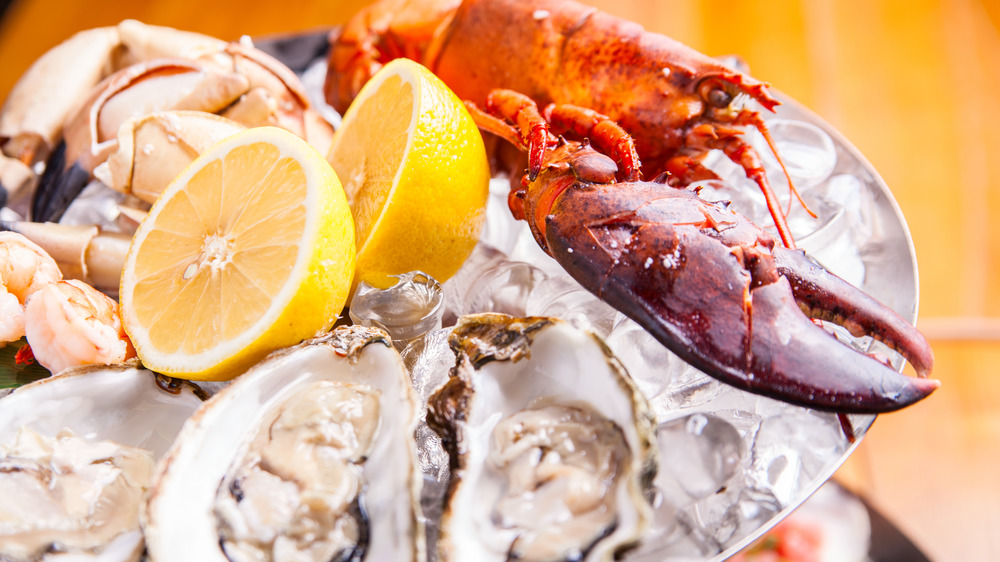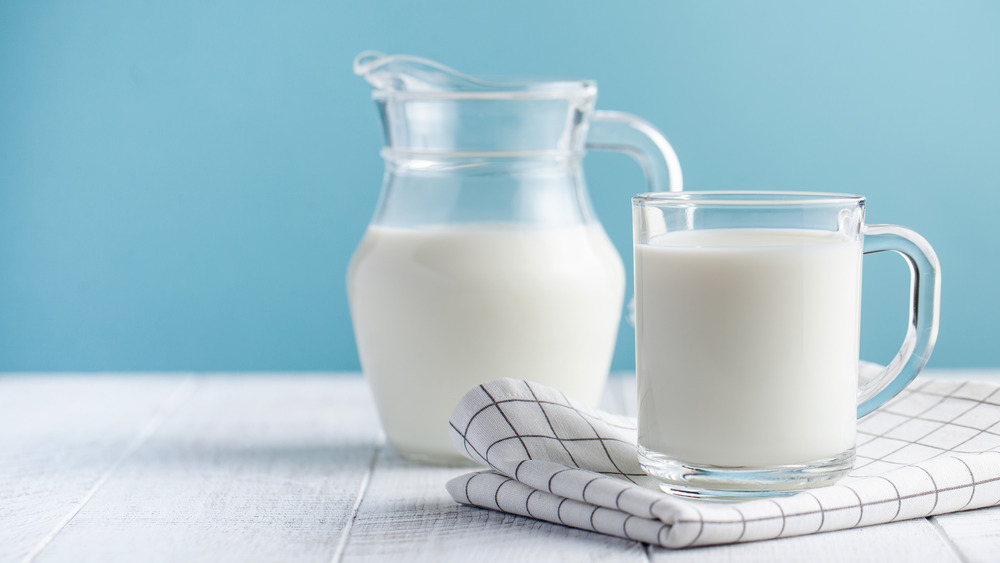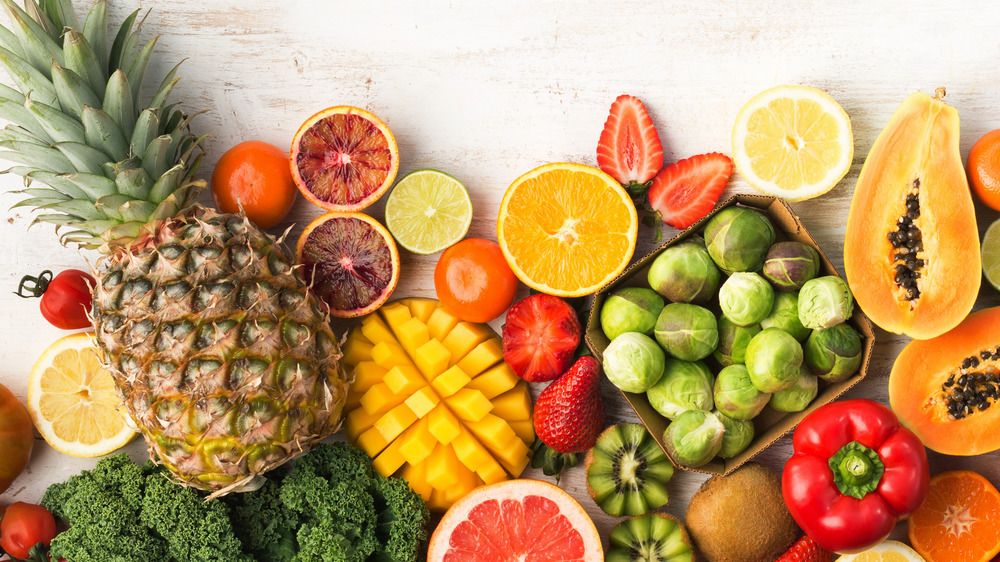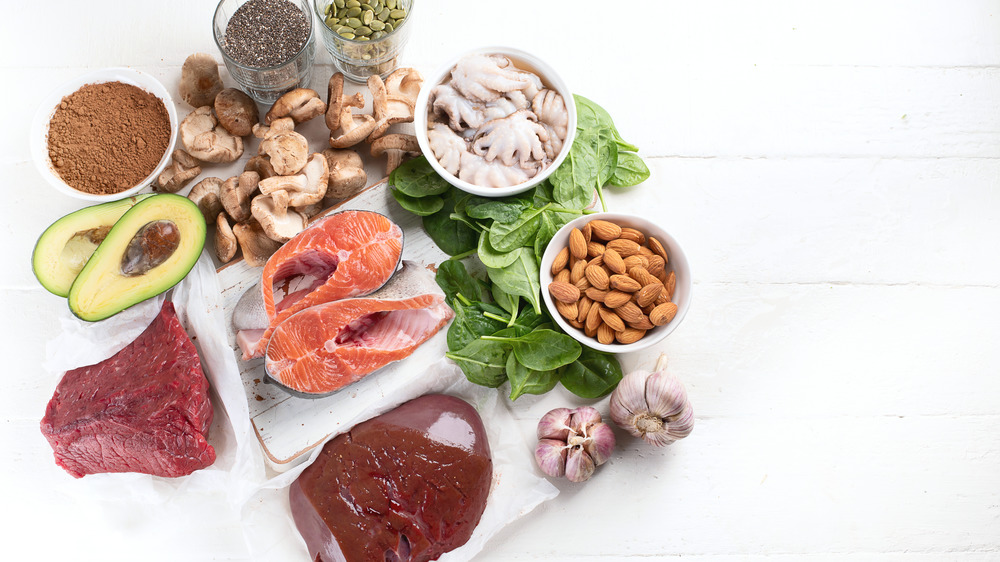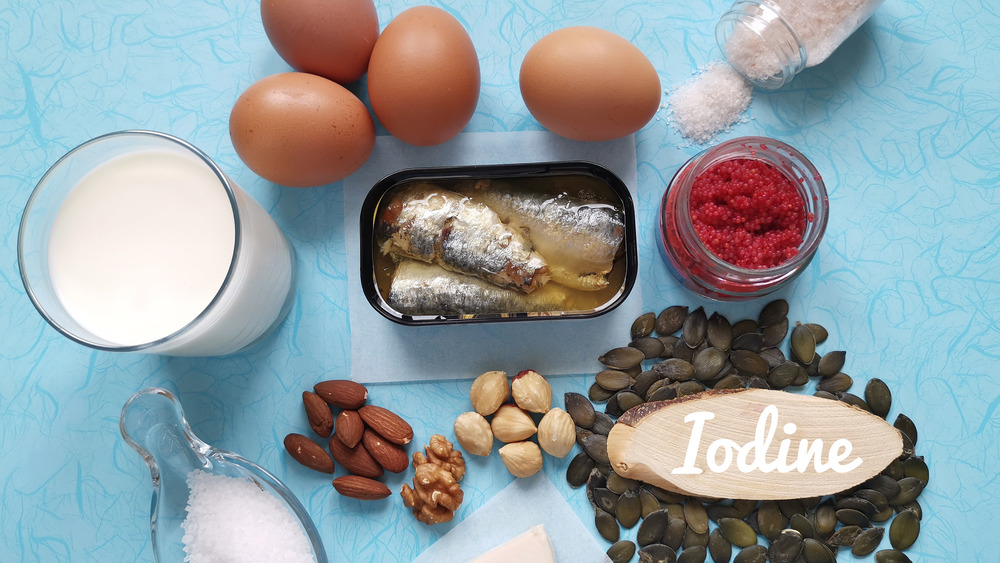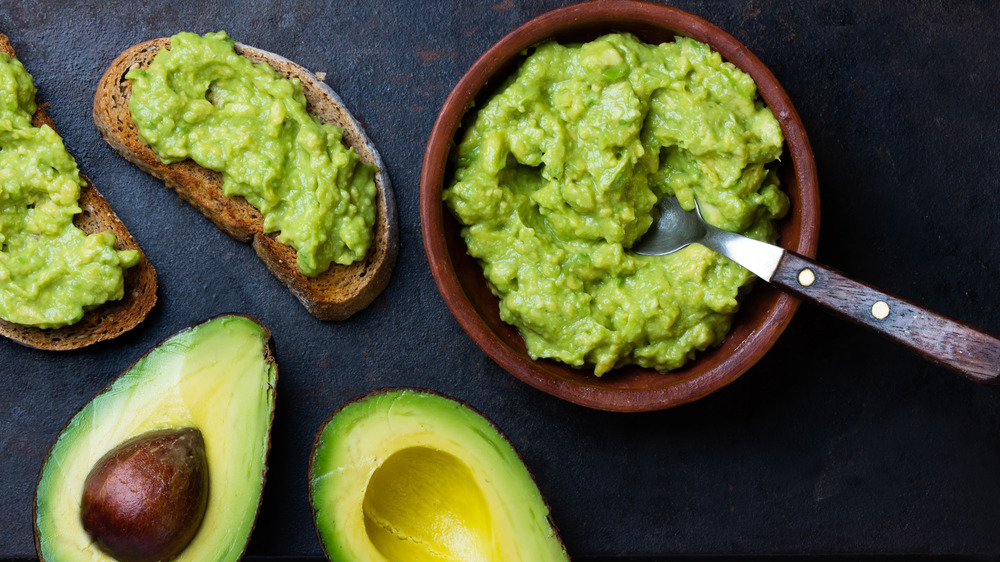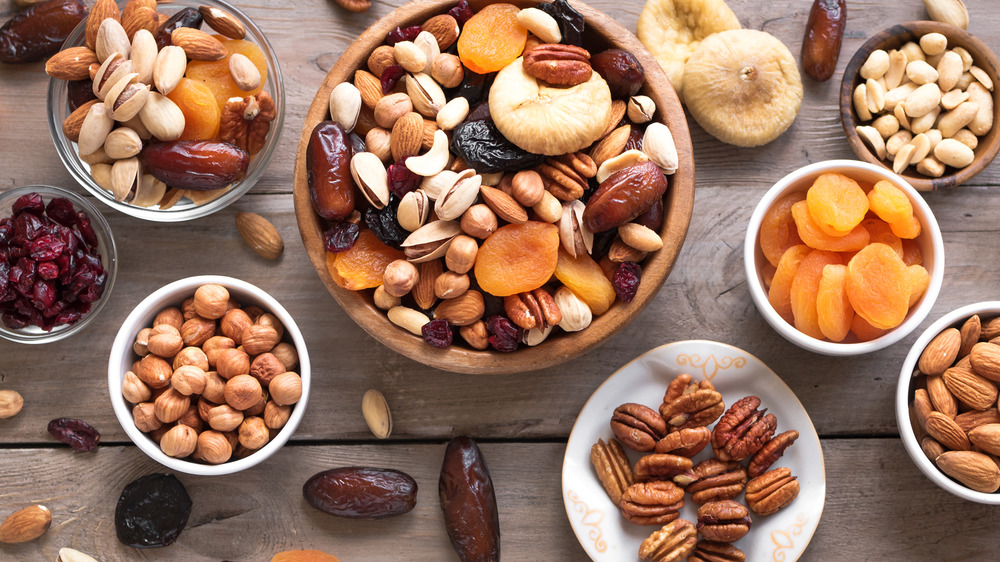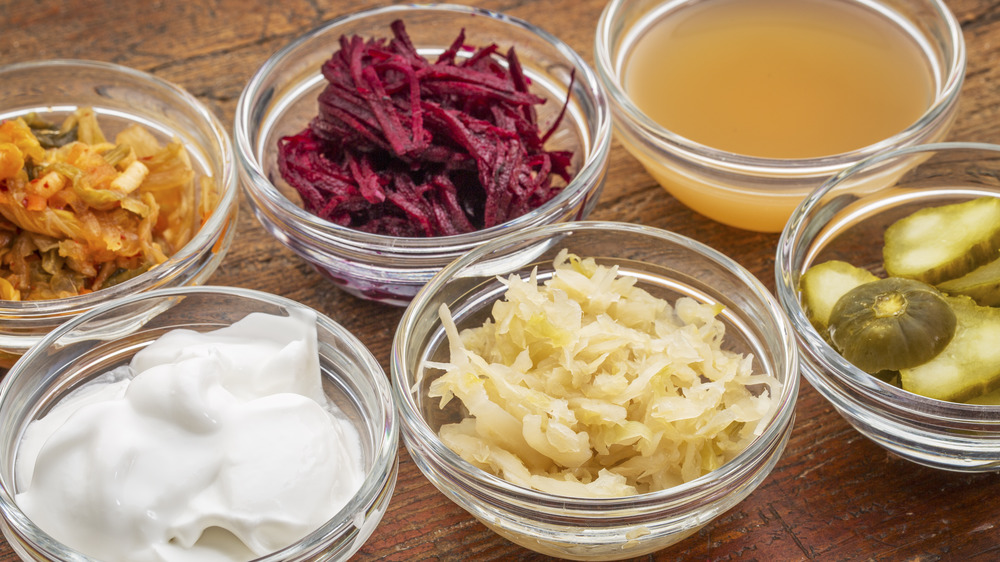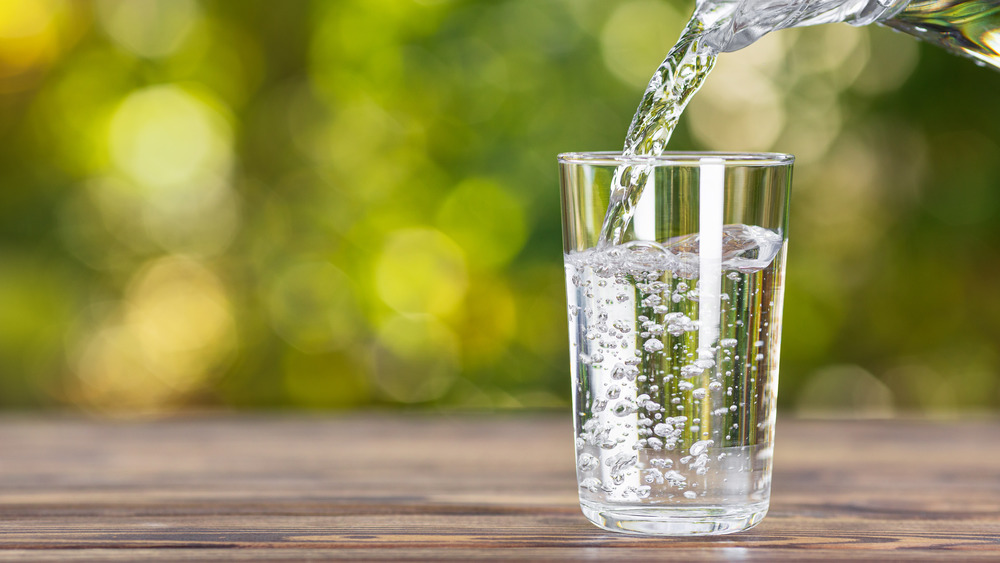If You Need More Energy, Start Eating These Foods
You might be low on energy for any number of reasons, according to the Mayo Clinic, but if you're trying to figure out why you've been feeling depleted, the first and most obvious place to look is at your eating habits. "Mental and physical fatigue are experienced when [the foods you're eating] do not meet ongoing demands of the brain and muscles," wrote the authors of a 2020 research paper published in Nutrients, which explored the relationship between intake of various micronutrients and perceived physical and mental fatigue and cognitive function.
The authors of the paper found that various nutritional deficiencies can cause us not just to feel low on energy but to exhibit clinical manifestations of conditions associated with low energy. Accordingly, consuming enough of various nutrients is important to maintaining energy levels. In addition, some foods are simply naturally energy-boosting, according to Healthline. This is because they contain nutrients that increase alertness and improve mood. Read on for the foods you should need to start eating for more energy.
Eating iron-rich foods can help deliver more oxygen to your muscles and brain
Your body needs oxygen, not just to breathe, but for your muscles and organs to function, registered dietitian Kelly Springer told Health Digest. The way oxygen gets where it needs to go in your body is via hemoglobin, which is found in red blood cells. For such oxygen transport to happen effectively, there has to be an adequate supply of healthy red blood cells, and the process by which red blood cells are manufactured by the body is erythropoiesis, according to an xPharm report.
Erythropoiesis requires iron. When your body does not have enough iron to produce adequate red blood cells, it's known as iron deficiency anemia (via Mayo Clinic). One of the most common symptoms of iron deficiency anemia is fatigue. Only a blood test can say if your tiredness is anemia-related, but for the moment, you can try increasing your consumption of iron by eating more red meats, organ meats, eggs, dark leafy greens, nuts, and beans, according to registered dietitian Trista Best, who told Health Digest that iron deficiency is the most common nutrient deficiency worldwide.
Eating more protein could help you feel more energized
Protein is critical to countless physiologic processes, according to registered dietitian Kelly Springer. She told Health Digest that protein supports the breakdown of food into energy, as well as the growth, maintenance, and repair of cells and tissues. It is also important to the functioning of the immune system (via WebMD). While your body is able to make some proteins on its own, others must be manufactured by your body using amino acids that are available only through diet — these are known as essential amino acids, according to WebMD.
A great source of protein is eggs, which contain not only protein (about 6 grams per large egg) but also a variety of vitamins and minerals including iron, vitamin D, and vitamin B-12, registered dietitian Amy Goodson told Health Digest. Other healthy sources of protein include lean meat, poultry, beans, soy, and low-fat dairy products.
Foods rich in B vitamins are critical to energy
All eight B vitamins are involved in at least some aspect of energy production, according to a 2020 research paper published in the journal, Nutrients. The paper pointed out that B vitamin deficiencies can lead to feelings of low energy as well as actual metabolic dysfunction. These vitamins include B1 (thiamine), B2 (riboflavin), B3 (niacin), B5 (pantothenic acid), B6 (pyridoxine), B8 (biotin), B9 (folate), and B12 (cobalamin).
Vitamin B12, in particular, is essential to the production of healthy red blood cells. And a deficiency can lead to certain forms of anemia, according to Harvard's Healthbeat. Apart from B12, your body isn't able to store the B vitamins for long periods, so consuming foods rich in B vitamins is important to maintaining adequate energy and optimal health (via Healthline). Such foods include red meat, organ meat, leafy green vegetables, salmon, shellfish, eggs, and dairy.
Pour yourself a glass of milk to reenergize
Vitamin D is a fat-soluble vitamin that's available naturally through sun exposure, but also through a few select foods, according to registered dietitian Trista Best. She told Health Digest that vitamin D deficiency can cause feelings of fatigue, muscle weakness, mood disorders, and even bone fractures.
As Best pointed out, "The relief one feels from their fatigue once they correct a vitamin D deficiency is surprisingly significant." However, the fatigue associated with vitamin D deficiency can have other causes as well, so a blood test is the best way to determine what's causing yours.
Foods rich in vitamin D include egg yolks, salmon, tuna, and foods that have been fortified with vitamin D, such as certain juices, breakfast cereals, and plant milks. But as registered dietitian Amy Goodson told Health Digest, vitamin-D-fortified lowfat milk might just be the ideal dietary source for vitamin D because it contains a significant amount in every glass, as well as a beneficial blend of carbohydrates and protein, which helps stabilize your blood sugar and, in turn, your energy levels.
Vitamin C doesn't just help prevent colds – it can actually help you feel more energized
Vitamin C (also known as ascorbic acid) is a water-soluble vitamin that supports the immune system, as well as other bodily functions, according to Harvard's Nutrition Source. And, per Penn Medicine, bolstering the immune system can help reduce feelings of fatigue. A 2012 study published in the Nutrition Journal found that intravenous vitamin C drastically reduced participants' fatigue.
This makes sense when you consider that a deficiency in vitamin C can cause weakness and muscle aches, which can be perceived as fatigue, according to a 2020 research paper published in Nutrients. Since vitamin C supports the metabolism of iron-rich foods, a deficiency can be a part of the process of developing anemia, as a 2014 study published in Free Radical Biology & Medicine, demonstrated. And, what's a common symptom of anemia? Fatigue, of course.
Fruits and vegetables are the best sources of vitamin C, especially citrus fruits, tomatoes, and potatoes, according to the National Institutes of Health's Office Dietary Supplements.
Foods rich in zinc can help you feel less depleted, especially if you're prone to depression
A deficiency in zinc, which is critical to many bodily processes, can lead to feeling sluggish or unwell (via Healthline). Specifically, zinc deficiency has been associated with immune system impairment, according to a 2009 study published in the European Journal of Clinical Nutrition. This impairment can result in fatigue (via Penn Medicine).
A 2006 study published in the Journal of Affective Disorders suggested that low blood levels of zinc are commonly observed in people who have been diagnosed with chronic fatigue syndrome. Low blood levels of this mineral have also been observed in people diagnosed with depression, a 2020 research paper noted. Like an impaired immune system, depression is often associated with feelings of fatigue.
Increasing your zinc intake may just quell your extreme tiredness. A 2017 study published in Einstein found that supplementing zinc reduced fatigue in cancer patients on a chemotherapy protocol. While zinc deficiency is difficult to diagnose, eating more zinc-rich foods is certainly one way to feel more energized. These include meat, fish and shellfish, poultry, beans, dairy products, whole grains, mushrooms, asparagus, and beet greens.
If your plant-based diet is leaving you sluggish, consider adding iodized salt to the mix
Scientists have long known that iodine is essential to thyroid function. However, a 2008 study published in Medical Hypotheses suggested that "iodine deficiency may give rise to subtle impairment of thyroid function leading to clinical syndromes resembling hypothyroidism or diseases that have been associated with the occurrence of hypothyroidism." And one of the most common symptoms of hypothyroidism is feeling sluggish and fatigued, according to Healthline. Other symptoms include muscle weakness, slowed heart rate, cognitive impairment, and constipation, all of which can indicate that the body is, literally, running on a "low" or "slow" setting.
You could be low on iodine if you're following a plant-based diet, as a 2020 study out of the German Federal Institute for Risk Assessment demonstrated. As healthy as a plant-based diet can be, it's lacking in natural sources of iodine, which tend to be animal-based. Think: eggs, tuna, cod, shellfish, and dairy products (via Healthline). If you're looking for plant-based sources of iodine, you'll want to turn to seaweed, prunes, lima beans, and iodized salt.
Foods rich in magnesium can help revive your energy
According to the National Institutes of Health's Office of Dietary Supplements (ODS), magnesium is involved in hundreds of biochemical processes in the human body, including "protein synthesis, muscle and nerve function, blood glucose control, and blood pressure regulation." It's also directly involved in energy production. So it stands to reason if you're not getting enough magnesium, you may start to feel low on energy.
As a 2020 research paper published in Nutrients pointed out, magnesium deficiency can actually lead to inflammation. And inflammation, itself, is associated with fatigue, according to a 2018 study published in Frontiers of Behavioral Neuroscience.
Other studies indicate that increasing the amount of magnesium in your bloodstream can help combat fatigue. For example, one study published in the journal The Lancet found magnesium supplementation to be an effective treatment for people with chronic fatigue syndrome. As it happens, this syndrome is also associated with low blood levels of magnesium. If you need to increase your magnesium intake, look to add more pumpkin seeds, chia seeds, nuts (specifically cashews, almonds, and peanuts), spinach, oatmeal, and yogurt to your diet (via ODS).
Eating fish can help prevent and ease feelings of fatigue related to depression
Fatigue is a symptom for more than 90 percent of people with major depressive disorder (via Medical News Today). Unfortunately, it's a fairly well-known phenomenon that depression-related fatigue doesn't necessarily lift even after the depression has been treated, as a 2011 study published in Innovations in Clinical Neuroscience explained.
While depression cannot be treated solely through diet, a 2014 study published in Oxidative Medicine and Cellular Longevity demonstrated that fish consumption is associated with a lower risk of being diagnosed with depression in the first place. And a meta-analysis from 2007, which was published in the Journal of Clinical Psychiatry, found that Omega-3 fatty acid supplementation could help to enhance the effects of antidepressant medications. If you think your fatigue is related to your depression, consider adding Omega-3 fatty acids to your diet by eating more salmon, sardines, and mackerel.
Try a combo of fruit and nuts for a rapid but sustainable energy boost
Sometimes the issue is not so much about being fatigued, but more about needing a quick boost of energy. On those occasions, grabbing a piece of fruit can quickly stabilize flagging blood sugar, according to registered dietitian Amy Goodson. Goodson's view is supported by registered dietitian Kelly Springer, who defended fruit's "bad" reputation for being high in sugar. Yes, fruit is high in sugar, Springer told Health Digest, but it's also high in fiber, which makes it take longer to digest, thereby offering sustained energy.
To help make fruit's energy boost last longer, you might want to consider enjoying fruit along with nuts. Nuts are a great source of both protein and fat, according to Healthline. As a result, nuts offer a slow, steady release of energy that will sustain you for a longer period of time (via Healthline). Plus, a 2015 study published in the Nutrition Journal suggested that a dried fruit-and-nut combo can reduce your risk of diabetes and heart disease.
Oats can provide a stable boost of energy
Eating a piping hot bowl of oatmeal can accomplish much the same thing as eating a combination of fruit and nuts: It can provide a rapid boost of energy without a subsequent energy crash. This is because oats are a complex carbohydrate with plenty of fiber, registered dietitian Amy Goodson told Health Digest. She explained that oats are rich in vitamins — especially B vitamins — and minerals, which are directly involved in the metabolic process converting food to energy.
"Oatmeal is slower to digest and supplies energy evenly instead of all at once," according to WebMD. "A bowl [of oatmeal] in the morning can keep you going for hours." Although oats will give you a much-needed boost of energy, you won't experience a rapid decrease of energy once it's digested. If hot oatmeal doesn't sound appetizing to you, there are plenty of other ways to enjoy oats. You can even blend them into a smoothie (via WebMD).
Fermented foods pack an energizing punch
Eating fermented foods (such as yogurt, kefir, sauerkraut, miso, and kimchi) helps promote optimal digestive health and a healthy immune system, according to the authors of 2014 research paper published in the Journal of Scientific Research.
Having a healthy digestive system and a strong immune system are both important to feeling "well," which is to say that sluggishness, fatigue, and mood disorders such as depression and anxiety are commonly observed in those with either a weakened immune system, digestive dysfunction – or both. Further, digestive dysfunction exacerbates poor immune health, whereas a healthy gut supports a stronger immune system, registered dietitian Trista Best pointed out to Health Digest.
So if you feel like you could use more energy, but you're fairly sure you're not deficient in any micronutrients, you might want to consider grabbing a bowl of kimchi or a cup of kefir, according to Best. She explained that fermented foods are a little-known but highly effective way to rev up your immune system and thus feel better overall.
If you need energy right this second, grab a cuppa
Science has shown that caffeine can improve alertness, focus, and performance — but that's probably not exactly news to you. What might be, however, is why. According to Brown University's B-Well publication, caffeine literally causes "neural excitation" in the brain, which results in the stimulation of the adrenal glands such that — even if everything is fine and dandy — your body believes and responds as if it were on high alert with regard to a threat or other emergency. The article authors also noted that caffeine increases levels of dopamine, the neurotransmitter that is associated with feelings of well-being. This is one reason why caffeine is considered addictive.
When you need to feel like you're raring to go, a cup of coffee could surely do the trick. However, if you prefer a slightly more gentle boost, consider green tea, registered dietitian Amy Goodson suggested to Health Digest. It contains significantly less caffeine (30 to 50 milligrams versus coffee's 100 to 200 milligrams), and it also packs a high concentration of powerful antioxidants, as well as L-theanine, which can help mitigate the caffeine jitters.
When you need more energy, a simple glass of water can do the trick
"Most of us know that the body is made up of a significant amount of water (60 percent to be exact), but for the most part, that's about as far as our understanding of the benefits of hydration go," according to registered dietitian Trista Best. The fact is, Best told Health Digest, since water is the main component of blood and is essential for carrying nutrients to cells and removing waste products, dehydration is probably one of the most common causes of fatigue that's not otherwise explainable.
And it's not just your body, per se, that suffers when you're not drinking enough water. According to a 2011 study published in the Cambridge University Press journal, Cambridge Core, even mild dehydration can negatively impact cognitive function. If you're feeling sluggish, whether physically or mentally, a glass of water could do you a world of good. And if you want to amp up the physical and mental health benefits even further, try adding a twist of lemon.

